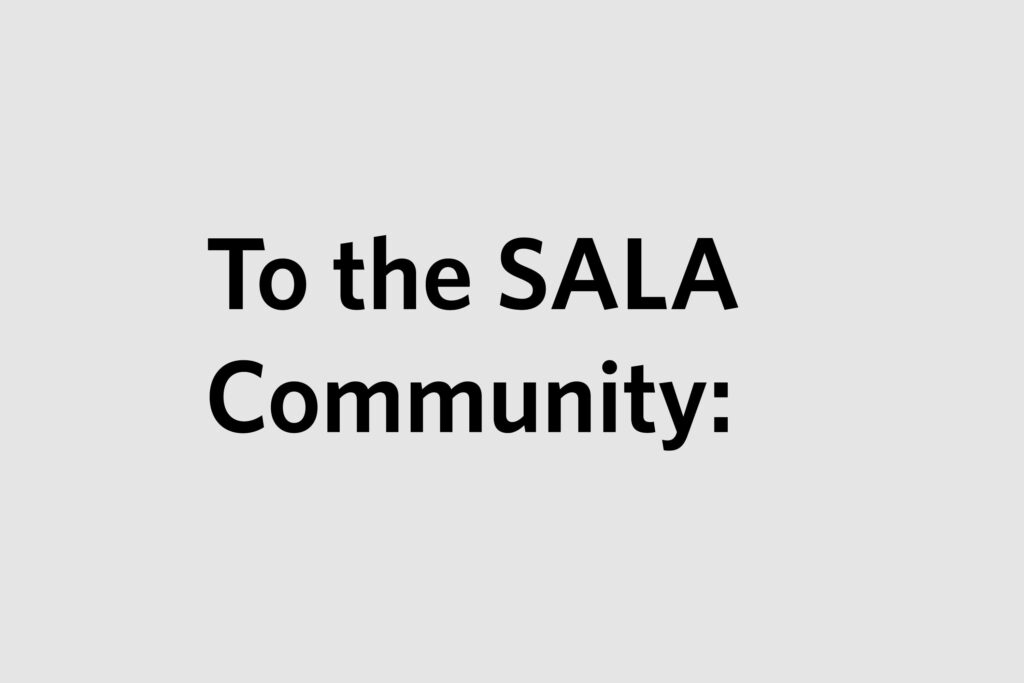
On the 11th of June 2020, 230 concerned SALA students and alumni wrote me and my faculty colleagues to call the school to action around the problems of structural racism. I thank them for a persuasive and thoughtful letter that everyone should read for themselves. A copy is linked here.
At its heart was deep care for SALA and the betterment of our community, professions and society that we serve. Its message urged the School to acknowledge that individuals and communities have experienced real distress from inadequate equity and diversity practices present in SALA and the broader academic and professional communities of which we are a part. This letter challenged SALA to acknowledge complicity in these practices and challenged the School to not only accept responsibility to improve conditions within SALA, but to also accept the urgency of change moving through society and become a leader, and an exemplar, for others. Prominent among the issues and recommendations were concerns for greater institutional accountability and transparency; faculty diversity; equity in the content, voices, and perspectives represented in the School’s academic, research, and outreach activities; and, lowering of discriminatory barriers and disincentives to equity in recruitment, admissions, academic progress, and access to professions.
I replied on the 14th of June, to acknowledge the letter, the issues raised and declare common cause in finding ways to achieve a just and equitable School, professions and society. I acknowledged that SALA bears responsibility for failing to sufficiently address barriers, practices and disincentives that inhibit the inclusion, experience and success of some. I also agreed that SALA can and will work harder to do better, offering that I would take immediate steps to learn and understand the problem and its contexts, and deploy that understanding toward long term, meaningful, durable and systemic solutions developed by and for SALA.
I also acknowledge that SALA operates within larger social, political and institutional structures, norms and practices in which white privilege is embedded and underlies racial inequities and barriers. I am committed to helping SALA work toward naming and dismantling as many of these as necessary to enable more equitable and inclusive alternatives. The journey will be difficult and uncharted. Many conversations will be controversial and uncomfortable. We will not avoid them but will ensure that they take place in safe and open fora.
I will be working with the entire SALA community, including faculty, students, staff, alumni, and professional peers, to enable these conversations and work toward common goals. Some initial measures taken, and soon to be taken, include:
· A SALA Equity, Diversity and Inclusion (EDI) committee will serve at the highest level of academic governance in the School. This committee (effective July 1, 2020) will bring together SALA faculty, staff, students and alumni to steer SALA toward more equitable, diverse and inclusive governance, administration, curricula, staffing and operations.
· New curricular guidelines across SALA programs, including in history / theory and professional practice courses, will be initiated. This will require rethinking the ways, means, and ethics through which our courses and design studios engage other communities, and inform the process and priorities around which we recruit and select future faculty, adjunct faculty and students.
· Student positions on SALA’s standing governance committees (curriculum, academic infrastructure, outreach, student affairs, research / post-professional studies, and the new EDI committee) will be broadly recruited. Students will learn more about these engagement opportunities in Fall semester.
· Every SALA faculty and staff member and student will participate in equity, diversity, and inclusion workshops tailored to our context and challenges, beyond the university-recommended anti-implicit bias training.
· A curated collection of design-school directed equity, diversity and inclusion information and resources will be posted for access and reference by every staff, student or visitor to the SALA website. Every SALA student will learn where, and to whom, to turn for information and advice on matters of equity, diversity and inclusion.
· Opportunities to engage our own community around issues and opportunities for equity, diversity and inclusion will increase and expand. These will include formal events such as public lectures and presentations as well as informal discussions among faculty, staff students, alumni and peers.
· Opportunities to engage with external voices and perspectives in our local, regional, national and international communities will increase and expand. These will include those of lecturers, adjunct faculty, guest critics, collaborators and partners.
· Student and faculty recruitment and hiring processes and procedures will be refined and expanded in close consultation with SALA’s EDI committee to ensure that recruiting initiatives and selection processes align with EDI goals and best practices.
Some imminent outcomes (this Fall) of the actions identified above include:
· A new Architectural Institute of British Columbia-sponsored entry scholarship will support an Indigenous Student in the new Bachelor of Design program.
· SALA will offer a seminar in ‘Indigenous Research Methods’ in the Master of Architecture program.
· SALA will participate in a cross-Canada online lecture and discussion series facilitated by the Canadian Council of University Schools of Architecture (CCUSA) in response to pressing calls to action in equity, diversity and inclusion at Canadian schools. Plans and schedules for this and related events are in development.
These initial steps as part of a long-term commitment necessary to create a truly equitable, diverse and inclusive design school. I look forward to working with the entire SALA community on this challenging project that will demand much of our individual and collective thought, reflection and creative energy, as well as our time and attention, over the coming academic year.
Sincerely,
Ron Kellett
SALA Director